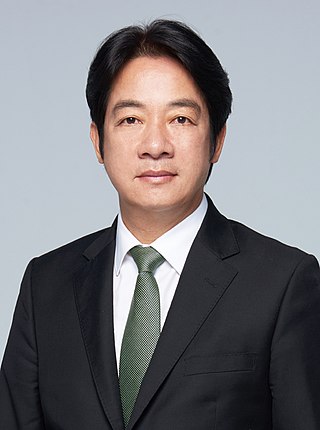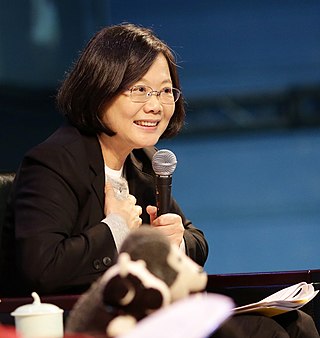Related Research Articles

Hope Su Tseng-chang is a Taiwanese politician who served as premier of the Republic of China (Taiwan) from 2006 to 2007 and again from 2019 to 2023. He was the chairman of the Democratic Progressive Party in 2005 and from 2012 to 2014. Su served as Chief of Staff to President Chen Shui-bian in 2004. He is currently the longest-serving Democratic Progressive premier in history.

David Lee Ta-wei is a Taiwanese politician and diplomat who is the chairman of Straits Exchange Foundation since 31 January 2023. He formerly served as the chairman of the Straits Exchange Foundation in 2020, the Secretary-General of the National Security Council of the Republic of China in 2018-2020, the Minister of Foreign Affairs from 20 May 2016 to 26 February 2018, and the Secretary-General to the President since 3 August 2020 to 31 January 2023.

Tsai Ing-wen is a Taiwanese politician who has served as the president of the Republic of China (Taiwan) since 2016. A member of the Democratic Progressive Party (DPP), Tsai is the first female president of Taiwan. She served as chair of the DPP from 2020 to 2022, and also previously from 2008 to 2012 and 2014 to 2018.

Chen Chi-mai is a Taiwanese politician and the current Mayor of Kaoshiung since August 24, 2020. He has served as spokesperson of the Democratic Progressive Party and the chief executive officer of its Policy Research and Coordinating Committee. A physician from Keelung, Chen started his political career by becoming member of the Legislative Yuan in 1996 and served as legislator for almost eight years before becoming the spokesperson of the Executive Yuan.

William Lai Ching-te is a Taiwanese politician who has been the Vice President of the Republic of China (Taiwan) since 2020. He served as a legislator in the Legislative Yuan from 1999 to 2010, and as Mayor of Tainan from 2010 to 2017, prior to taking office as premier of the Republic of China.

The 2017 Summer Universiade, officially known as the XXIX Summer Universiade and commonly called Taipei 2017, was an international multi-sport event that took place in Taipei, Taiwan from 19 to 30 August 2017.

Cho Jung-tai is a Taiwanese politician. He served on the Taipei City Council from 1990 to 1998, when he was first elected to the Legislative Yuan. Cho remained a legislator through 2004, when he was appointed deputy secretary-general to the president during the Chen Shui-bian administration. During Frank Hsieh's 2008 presidential bid, Cho assumed the post of Secretary-General of the Democratic Progressive Party. He returned to public service in 2017, as secretary-general of the Executive Yuan under Premier William Lai. In 2019, Cho succeeded Tsai Ing-wen as leader of the Democratic Progressive Party. He remained leader of the party until May 2020, when Tsai resumed the role.

Shen Lyu-shun was a Taiwanese diplomat who served at posts in the United States and Europe. He also served in the Department of North American Affairs in the Taiwanese Ministry of Foreign Affairs. He was best known as serving as the representative of the Republic of China to the United States from 2014 to 2016.

Presidential elections were held in Taiwan on 16 January 2016. Democratic Progressive Party (DPP) candidate Tsai Ing-wen with her independent running mate Chen Chien-jen won over Eric Chu of the Kuomintang (KMT) and James Soong of the People First Party (PFP). Tsai became the first female president in Taiwan, as well as the Chinese-speaking world.

Stanley Kao is a Taiwanese diplomat.

Wu Tsung-tsong is a Taiwanese politician.

Kung Ming-hsin is a Taiwanese politician.

The Trump–Tsai call was a telephone conversation between the U.S. President-elect Donald Trump and the President of the Republic of China Tsai Ing-wen which took place on December 2, 2016. This event marked the first time since 1979 that a U.S. president or President-elect had directly spoken with a ROC President. In the call, Tsai congratulated Trump for his victory in the presidential election. The two leaders spoke for around 10 minutes, focusing on politics, economy, and security in Asia-Pacific. Following the call, Trump publicized this on Twitter and Facebook and said thank you to "the President of Taiwan". After Trump's transition team confirmed the event, the Presidential Office of Taiwan released a statement about the content of the call.

The Taiwan Travel Act is an Act of the United States Congress. Passed on February 28, 2018, it was signed into law by President Donald Trump on March 16, 2018. As a follow-up to the Taiwan Relations Act, the bill allows high-level officials of the United States to visit Taiwan and vice versa.

Presidential elections were held in Taiwan on 11 January 2020 along with the 10th Legislative Yuan election. Incumbent president Tsai Ing-wen and former premier William Lai of the Democratic Progressive Party (DPP) won the election, defeating Kaohsiung mayor Han Kuo-yu of the Kuomintang (KMT) and his running mate Chang San-cheng, as well as third-party candidate James Soong.

Yiong Con-ziin is a Taiwanese politician. He worked in several capacities within the Democratic Progressive Party, and was named minister of the Hakka Affairs Council on 20 May 2020.
Paulo Eduardo Lima Martins is a Brazilian politician and journalist.

Harry Ho-jen Tseng is a Taiwanese diplomat who has served a deputy Minister of Foreign Affairs of Taiwan since 2020 and its representative to Canada since 2022.

Somaliland–Taiwan relations refers to the relationship between the Republic of Somaliland and the Republic of China (Taiwan). The two countries have no formal diplomatic relations, but they have established embassy-like representative offices in each other's capital. Taiwan's Ministry of Foreign Affairs refers to Somaliland as a country as of 2023, implying official recognition. Taiwan is currently the only country in the world to recognize Somaliland in this capacity.
Respirator diplomacy of Taiwan refers to the exchange of masks between Taiwan and other countries, aimed to help the Global Coronavirus Response.
References
- 1 2 3 "Deputado brasileiro acusa China de impedir apoio à posse em Taiwan". Notícias ao Minuto (in Portuguese). Lusa. 26 May 2020. Retrieved 27 May 2020.
- ↑ Palki Sharma, ed. (27 March 2020). "#vivaTaiwan: Now, China faces backlash over Taiwan in Brazil". WION.
- 1 2 "Brazilian netizens fight back against CCP threats over Taiwan support". Taiwan News . 26 May 2020. Retrieved 27 May 2020.
- ↑ "MOFA thanks Brazil congressman for leaking China ploy – Taipei Times". Taipei Times . 29 May 2020. Retrieved 3 June 2020.
- ↑ Lu, Yi-hsuan; Xie, Dennis (29 May 2020). "MOFA thanks Brazil congressman for leaking China ploy". Taipei Times. Retrieved 29 May 2020.
- ↑ "#VivaTaiwan?被中國戰狼外交惹火的巴西「台灣萬歲」事件". United Daily News. 26 May 2020. Retrieved 29 May 2020.
- ↑ Flor, Mamela Fiallo (29 May 2020). "Brazil Stands With Taiwan Against Chinese Totalitarianism". PanAm Post . Retrieved 3 June 2020.
- ↑ Dunst, Charles (2 June 2020). "Welcome to China's new interventionist foreign policy". The Washington Post. Retrieved 12 June 2020.
- ↑ Deb, Sandipan (31 May 2020). "Decode the concept of 'tianxia' to understand China's actions". Livemint. Retrieved 12 June 2020.